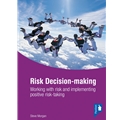What makes positive risk-taking a reality in dementia services?
 Thursday, February 4, 2016 at 2:30PM
Thursday, February 4, 2016 at 2:30PM Steve Morgan (Practice Based Evidence) and Nick Andrews (Practice Development Officer in Swansea University) got together to ponder this particular question in response to a Journal for Mental Health Training, Education and Practice journal request, and the following link will take you to the unpublished first draft of the ideas.
Health and social care services have experienced a decade or more of messages to become more person-centred, to listen more to people and deliver on the priorities they want for themselves. This requires a fundamentally positive mindset from professionals and care workers, and a willingness to take some risks. How will this apply to delivering dementia services, where almost all of the initial impressions are of deficits, disability and disadvantage? The following link offers some practical tips on reflecting from a basis of values, seeing the person but focusing on rights and relationships, and working from a position of the individual’s strengths. All of these underpin a ‘positive risk-taking’ approach to helping people make decisions for themselves, or to make decisions for people in their best interests.
 dementia,
dementia,  positive risk in
positive risk in  Positive risk-taking
Positive risk-taking 






